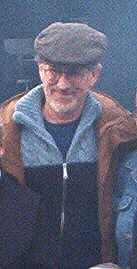Nobody but Steven Spielberg knows what he saw when he strolled through that neighborhood in lower Bayonne that day in August.
While he had come ostensively to film the main character’s home life portion of The War of the Worlds, Spielberg many have been reliving aspects of his old childhood, as he had apparently done in prior films, exploring new aspects and new possibilities, seeking to work out some previously unresolved personal issue through his art.
People rarely escape their pasts – even men like Spielberg whose films have made them billions.
Did he see this block as a block similar to one in Cincinnati or Phoenix where he had grown up, or some other place where his father had once lived?
Henry Sanchez – whose house Spielberg had picked to become the home of the film’s main character for a six day shoot and months of preparation – didn’t know what to make of the scraggly-bearded man who showed up at his door that day in August, claiming to be Spielberg and asking for use of the house.
Dressed in jeans, a jacket, and a baseball hat bearing the logo of Brown University rather than some popular major league team, Spielberg looked a lot like the working class people that still lived in many parts of Bayonne. Perhaps the only thing that gave Spielberg away as part of the Hollywood elite were the aviator sunglasses he wore inside as well as outside the house.
What vision the legendary film-maker had remained as much of a secret to Sanchez as the name of the movie, although he later learned that the film then entitled “Out of the Night” would be a modern-day remake of H.G.Wells’ War of the World.
Sanchez only later realized how lucky he was to even be standing in the same room as Spielberg, and how some excited fans would have given up their lives to exchange places with him for that moment in time – part of that sometimes crazed cult of personality that had risen up around Spielberg and at times haunted him.
But to Sanchez, not blinded by such illusions, saw Spielberg in more ordinary terms, someone who asked questions about the house and its contents like any other guest.
In some ways, Spielberg may be something of a fraud, even to himself, a man behind the curtain, pulling levers to shape the special effects that surround his life, projecting the image of master magician, a Wizard of Oz, everyone else sees as all powerful.
Spielberg that day in August in Bayonne may even have wondered at the level of his own success and how he had managed to rise to such prominence from the 12 year old boy with an 8 mm camera making his first film. Perhaps he even chuckled to himself over his own cleverness, how like the carnival magician who had snuck out a picture from Dorothy’s purse managed to fool everyone into thinking his tricks were magic.
Indeed, as in the 1939 classic, Spielberg’s balloon seems to have carried him over the rainbow to heights even he could not have imagined at a boy. Was he embarrassed by his own success? Did he need to keep his secrets so close as to keep anyone from pulling open the curtain to show the mechanisms behind the curtain, and see the vulnerable, perhaps even comic soul hidden behind the sunglasses?
Sanchez remembered how Spielberg admired the house, walking through each room as if through hallways of his own past, pausing briefly at the collection of World War Two memorabilia Sanchez had collected in the basement.
“He told me he liked them,” Sanchez sad, unaware of Spielberg’s childhood filmmaking efforts had included a 40-minute World War Two epic called Escape to Nowhere” long foreshadowing the much later film, Saving Private Ryan.
Spielberg talked straight with Sanchez, less the formidable Wizard of Oz, than the ordinary craftsman seeking to make something as simple as a table or a chair, each piece of the film puzzle put together in his head. Later, Spielberg’s assistants, David or Matthew would keep Sanchez apprized of latest developments, giving him a sense of what needed to be done when, and what was expected of Sanchez.
Was Sanchez in awe of Spielberg?
He was in awe of the reputation, he said, but seeing the man in the flesh, Sanchez said he was surprised at how real Spielberg was, a man free of pretension.
Media and isolation seemed to exaggerate Spielberg into something bigger than life, the way distance and misinformation painted the Wizard of Oz in the minds of the munchkins, exaggerating the Wizard into something even he could not maintain.
Yet in some ways, Spielberg managed it – each new construction adding to his mythology, creating a cult of followers he did not intend nor encourage.
Being in the same room with him, breathing the same air, Sanchez saw Spielberg instead as some kind of master technician, juggling those pieces of a puzzle in his head, seeing something Sanchez could not see, something that the general public would later come to think of as magic.
Contact Al Sullivan at asullivan@hudsonreporter.com